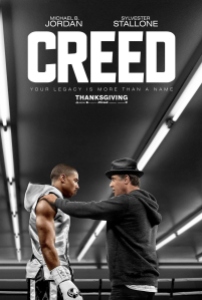Ryan Coogler directs this Rocky sequel about Apollo Creed’s son.
 “Rocky” is one of the finest examples of Americana ever put onto film, and “Raging Bull” is among the absolute best movies of all time. But outside of those two obvious choices, the most memorable boxing movies are the ones that go beyond just being a boxing movie. “The Fighter” plays with genre conventions by invoking family dynamics and a drug addicted brother who is more interesting than the protagonist. “Million Dollar Baby’s” final fight isn’t in a ring at all.
“Rocky” is one of the finest examples of Americana ever put onto film, and “Raging Bull” is among the absolute best movies of all time. But outside of those two obvious choices, the most memorable boxing movies are the ones that go beyond just being a boxing movie. “The Fighter” plays with genre conventions by invoking family dynamics and a drug addicted brother who is more interesting than the protagonist. “Million Dollar Baby’s” final fight isn’t in a ring at all.
It’s easy to see why Ryan Coogler’s “Creed” is so rousing, and beyond swapping “Rocky’s” racial roles, it even plays with ideas of legacy and living in someone’s shadow, with Coogler (“Fruitvale Station”) smartly drawing from previous “Rocky” sequels in order to make something more meaningful and modern.
But “Creed” is still a boxing movie. A very good one, but it still has a big final showdown with an unbeatable opponent, an ego-driven, yet talented underdog of a fighter working his way up from the working class, and not to mention a training montage. How many different ways can you shoot the speed bag being pummeled and carefully worked over, or the jumping ropes moving faster and faster until they’re hurled to the ground?
Coogler from the film’s first moments frames Adonis Johnson (Michael B. Jordan) as something of a God, as is fitting with his name. His physique is hulking and hunched over in our first glimpses of him. But the strength of “Creed” lies in how Adonis has to grapple with that persona. Apollo Creed’s widow adopts him at a young age and Adonis works to hide his silver spoon upbringing; he wants to succeed not because he’s Apollo’s son or because his wealth was handed to him.
Coogler’s message is to embrace legacy while still carving one of your own. “Use the name; it’s yours,” Adonis’s girlfriend says, before he’s gifted with a pair of American flag boxing shorts that read CREED on one side and JOHNSON on the other.
Coogler also plays with cinematography in interesting ways to reimagine how a “Rocky” sequel can look. Rather than striving to reach the top of some steps, Coogler slows down time around Adonis in a ravishing look at the Americana of the urban streets, with ATVs rocketing around a sweating, menacing Adonis. There’s also a mid-movie fight that steals the show from the finale in that it’s accomplished in a single take over two rounds and several minutes. Rocky’s own personal struggles overwhelm whether we care about the final fight’s ultimate outcome, but at the very least it aims to put a pin in the idea of more “Rocky” movies.
Jordan as an actor seems extremely confident in his own skin, aware of his body and using it to get at Adonis’s brashness and ego. Like Jake Gyllenhaal in “Southpaw,” the physical transformation is not just a practical feature of the character Jordan is portraying but very much a part of Adonis’s energy. As for Stallone, the appeal of his performance is that he’s aged into the gruff, seasoned veteran role full of wisdom and discreet fatherly affection, but he’s retained Rock’s dopey charm. Whether his still garbled Philly accent is Oscar worthy is up for debate.
3 stars
 Marvel movies have been disposable. They’ve been designed to be the same. And even the best ones have only shown glimmers of the personality behind the camera. All that changes with “Black Panther.” In fact, so much has changed with this film. It signals not just a new step forward for Marvel, but a shift in the modern blockbuster’s ability to be political and current, and it’s an absolute leap forward in what we should demand from black cinema.
Marvel movies have been disposable. They’ve been designed to be the same. And even the best ones have only shown glimmers of the personality behind the camera. All that changes with “Black Panther.” In fact, so much has changed with this film. It signals not just a new step forward for Marvel, but a shift in the modern blockbuster’s ability to be political and current, and it’s an absolute leap forward in what we should demand from black cinema.
 “Rocky” is one of the finest examples of Americana ever put onto film, and “Raging Bull” is among the absolute best movies of all time. But outside of those two obvious choices, the most memorable boxing movies are the ones that go beyond just being a boxing movie. “The Fighter” plays with genre conventions by invoking family dynamics and a drug addicted brother who is more interesting than the protagonist. “Million Dollar Baby’s” final fight isn’t in a ring at all.
“Rocky” is one of the finest examples of Americana ever put onto film, and “Raging Bull” is among the absolute best movies of all time. But outside of those two obvious choices, the most memorable boxing movies are the ones that go beyond just being a boxing movie. “The Fighter” plays with genre conventions by invoking family dynamics and a drug addicted brother who is more interesting than the protagonist. “Million Dollar Baby’s” final fight isn’t in a ring at all.